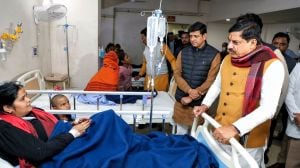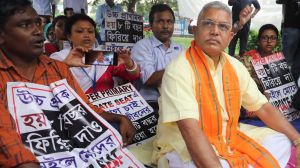CBI probe ordered into Varghese8217;s death
KOCHI, JAN 28: The Kerala High Court on Thursday ordered Central Bureau of Investigation CBI to probe into the alleged custodial murder...

KOCHI, JAN 28: The Kerala High Court on Thursday ordered Central Bureau of Investigation CBI to probe into the alleged custodial murder of Naxalite leader, Varghese, which took place over 28 years ago.
The investigation should be completed in six months from the date of registering a First Information Report FIR on the basis of the counter-affidavit filed in the court by P Ramachandran Nair, a retired CRPF constable, confessing that he had, under threat to his own life from higher police officials, shot Varghese dead at 6.55 pm on February 18, 1970.
Allowing a batch of writ petitions filed by Niyamavedi, Kochi, and others, Justice C S Rajan pointed out that the police had described Varghese8217;s death as an encounter death at the time of the incident 8211; when Varghese was apprehended by the police, he fired a shot at the Superintendent of Police who in self-defence fired back resulting in the death of Varghese.
The Universal Declaration of Human Rights has identified several rights as basic human rightswhich are inalienable, which include the right to protection from arbitrary arrest and detention and the right to life, liberty and security. Article 21 of the Constitution provides that no person shall be deprived of his life or liberty except according to the procedures established by law.
Article 22 guarantees protection against arrest and detention in certain cases. It also declares that no person who is arrested shall be detained in custody without being informed of the ground for such arrest. He should not be denied the right to consult and be defended by a legal practitioner. It also ensures production of the arrested person before a magistrate within 24 hours of the arrest.
In tune with these Constitutional provisions, a large number of statutory provisions also seek to protect the personal liberty, dignity and basic rights of citizens.
Therefore, the court said, the situation about a quarter century ago was not different from the situation now. The statutory provisions in the Constitution forsafeguarding the fundamental rights were vibrant in those day also. Article 21 providing for absolute personal liberty, described as a cherished right, under the Constitution was also very much there.
Nair, who was impleaded as the additional fifth respondent has sworn that he had killed Varghese by shooting him. The former cop said in his affidavit that he was swearing the affidavit quot;voluntarilyquot;, without any inducement, threat or coercion or promise from any source in whatsoever manner. quot;I am also well aware that, any disclosure incriminating in nature is likely to be used against me in any subsequent judicial proceeding or trial for the offence of murder, yet I am inclined to swear this affidavit before the court knowing fully well of the repercussions and consequences, on the call of my own conscience,quot; Nair had said.
On these disclosures, the petitioners wanted CBI probe. The Additional Advocate General had submitted that the Government had no objection to ordering any kind of inquiry into thecircumstances and cause of Varghese8217;s death and that the Government was taking steps to get a judicial inquiry conducted. The relatives of Varghese his younger brother Thomas and his son Varghese were satisfied with a judicial inquiry.
Judicial inquiry, though laudable in its objective, always involves time, money and energy, the court said. The result can only be certain recommendations or findings regarding the cause of Varghese8217;s death. The government is not bound to accept these recommendations. Instances are not wanting when governments have completely rejected the report of such inquiry commission, if those recommendations did not satisfy their views or ideology.
Even if the government accepts the recommendations in toto, further criminal action has to be initiated. Hence no useful purpose willbe served in ordering a judicial inquiry. Perhaps such a decision may set at rest, for the time being, the controversy sparked off by the disclosure of Nair.
At the same time, a police investigation willlead to prosecution of the real accused. Under these circumstances, the more effective step is to direct the police to investigate the crime, for which the counter-affidavit of Nair can be the basis. The counter-affidavit accuses a DIG, SP and DySP of the Kerala police. Therefore, it will be embarrassing for the Kerala police to investigate the allegations against top officials of the police force in the State. It is, therefore, better that such a case is dealt with by the CBI so that nobody can raise any charge of partiality or favouritism.
If the petitioners had claimed payment of compensation, the court said it would not have hesitated to award it in view of the the Supreme Court rulings. But Varghese8217;s relatives are not interested in getting compensation from the State for the cold-blooded murder of the Naxalite leader.
The CBI is, therefore, directed to register an FIR on the facts disclosed in the counter-affidavit. This should be done within two weeks of the date of receipt of the copy of thejudgment. If there is any difficulty in completing the investigation in six months, it is for the CBI to seek further time, the court said.
- 01
- 02
- 03
- 04
- 05































